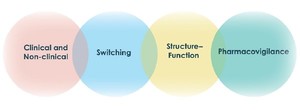The development of Pelmeg, a biosimilar of pegfilgrastim, revealed flexibility in the regulatory guidelines as they were superseded by state-of-the-art science, a study uncovers [1].
Pelmeg developed with aid of regulatory reform
Biosimilars/Research
|
Posted 19/03/2021
 0
Post your comment
0
Post your comment

Pegfilgrastim is a long-acting, pegylated form of human recombinant granulocyte colony-stimulating factor (G-CSF; filgrastim), which is expressed by Escherichia coli (E. coli). The originator is Neulasta. When designing the Pelmeg clinical studies to demonstrate comparability to Neulasta, it became apparent that existing regulatory guidelines were in need of reform, considering the latest science on comparability of G-CSF biosimilars. The guidelines stated that confirmatory pharmacodynamic/pharmacokinetic (PK/PD) studies may be sufficient if an accepted surrogate marker for efficacy is available and explicitly mentions absolute neutrophil count (ANC) as a validated and accepted biomarker for the efficacy of G-CSF. However, it was not clear as to whether clinical trials in patients could be waived altogether.
Following this realization, in 2015, scientific advisory meetings were held with European national regulatory authorities and the European Medicines Agency (EMA) to discuss Pelmeg’s clinical development. It was agreed that clinical studies in patients could be waived. This led to the creation of a concept paper on the revision of the guideline on non-clinical and clinical development of similar biological medicinal products containing recombinant G-CSF that was published by EMA in July 2015. Specifically, this recommended revisions to the guidance on similar medicinal products containing recombinant G-CSF. Ultimately, in 2018, this became draft of the guideline for biosimilar development of G-CSFs, stating that efficacy and safety studies in patients are not necessary.
Following the discussions with regulators, Pelmeg’s clinical programme was conducted between August 2015 and June 2017. As a result of the discussions, which demonstrated flexibility in the guidelines, the Pelmeg biosimilar was developed using a targeted approach. This involved full characterization of the reference product Neulasta, against which the biosimilarity of Pelmeg was assessed by a head-to-head analytical characterization. State-of-the-art, orthogonal analytical methods were undertaken to characterize the structural and functional characteristics of both drugs and to demonstrate their analytical similarity. As a product containing recombinant G-CSF, a surrogate endpoint for efficacy was available which meant that its clinical development programme was limited to PK and PD studies and phase III studies were waived. This led to its European Union (EU) approval in 2018.
This study highlights that Pelmeg’s development programme was guided by scientific discussion with regulatory authorities. This demonstrates that scientific discussion with regulators offers valuable opportunities for dialogue regarding scientific progress related to the comparability of biosimilars.
Related articles
EMA approval for Pegfilgrastim Mundipharma
Biosimilars approved in Europe
| LATIN AMERICAN FORUM – Coming soon! To further enhance the objectives of GaBI in sharing information and knowledge that ensure policies supportive of safe biosimilars use, we are pleased to announce that we will be launching a new section on GaBI Online and GaBI Journal, the ‘Latin American Forum’ (in Spanish) featuring the latest news and updates on research and developments in generic and biosimilar medicines in Latin America. Register to receive the GaBI Latin American Forum newsletter. Inform colleagues and friends of this new initiative.
LATIN AMERICAN FORUM – Próximamente! Para fomentar los objetivos de GaBI sobre la difusión de información y conocimiento sobre las políticas de apoyo que garantizan el uso seguro de medicamentos biosimilares, nos complace anunciar el lanzamiento de una nueva sección en GaBI Online y GaBI Journal, el ‘Latin American Forum’ (en español), que presentará las últimas noticias y actualizaciones en investigación y desarrollo sobre medicamentos genéricos y biosimilares en Latinoamérica. Regístrese para recibir el boletín informativo GaBI Latin American Forum. Informe a colegas y amigos sobre esta nueva iniciativa. |
Reference
1. Roth K, Wessels H, Höfler J, Scholz U, Lehnick D. Pelmeg®, a biosimilar pegfilgrastim developed in the context of evolving regulatory guidelines. Generics and Biosimilars Initiative Journal (GaBI Journal). 2020;9(3):125-31. doi:10.5639/gabij.2020.0903.021
Permission granted to reproduce for personal and non-commercial use only. All other reproduction, copy or reprinting of all or part of any ‘Content’ found on this website is strictly prohibited without the prior consent of the publisher. Contact the publisher to obtain permission before redistributing.
Copyright – Unless otherwise stated all contents of this website are © 2021 Pro Pharma Communications International. All Rights Reserved.
News
FDA approves Poherdy (first interchangeable pertuzumab) and Armlupeg (pegfilgrastim) biosimilars
EMA recommends approval for insulin glargine biosimilar Ondibta and denosumab biosimilar Osqay
General
Samsung Bioepis wins Pyzchiva case; Regeneron patent rulings threaten foreign biosimilars
Chinese biosimilars go global: growth, partnerships, and challenges
What is the future for the US biosimilar interchangeability designation

Biosimilars/Research Posted 05/06/2025
Biosimilar clinical efficacy studies: are they still necessary?

Biosimilars/Research Posted 27/05/2025
The best selling biotechnology drugs of 2008: the next biosimilars targets








Post your comment